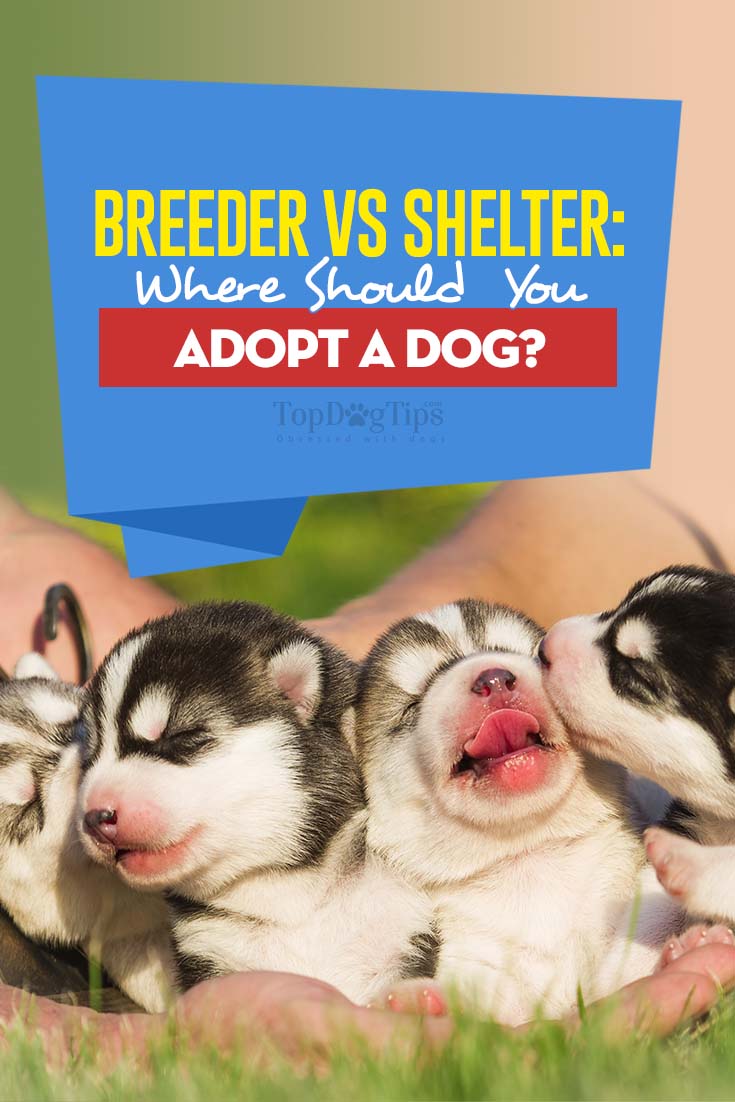Should you adopt a dog from a shelter or shop for a dog from a reputable breeder? Here’s what you should know before adopting a dog from either place.
It's a question many future pet owners face: is there a difference if you get a dog from a reputable breeder versus an animal shelter? You already know the saying “adopt, don't shop” and we discussed the dangers of puppy mills on our podcast with a representative from PETA. With that considered, breeders and shelters still remain the two main options you have for adopting a pup.
The source of adoption is one of the first most important decisions you'll have to make as a potential pet owner. When there are over 6.5 million stray animals in shelters across the U.S., as per the American Society for the Prevention of Cruelty to Animals (ASPCA), you could make a big difference in the life of one dog if you adopt from these shelters.
However, just 20 percent of these shelter animals are actually adopted, according to the Humane Society statistics. Most people still adopt their dogs from breeders (with a number of those being irreputable breeders and puppy mills), and it's likely because there is an underlying belief that animals from breeders are far superior in health and disposition than shelter dogs.
Advantages of Adopting Dogs from Reputable Breeders
 There's many legit breeders in the U.S. where you can legitimately adopt a dog of a specific breed. In some instances, you know that you're getting a purebred puppy from a reputable breeder and it's a dog that has been well taken care of. You could likely even see the mom of the pup and inspect the conditions of where the animal was raised before you bring the dog home.
There's many legit breeders in the U.S. where you can legitimately adopt a dog of a specific breed. In some instances, you know that you're getting a purebred puppy from a reputable breeder and it's a dog that has been well taken care of. You could likely even see the mom of the pup and inspect the conditions of where the animal was raised before you bring the dog home.
Reputable breeders care for their animals. They usually do genetic health tests for the puppies in the litter to make sure that these won't have inherited health problems as adults. Reputable breeders also provide potential pet parents basic care, grooming, feeding, and behavior training information about the breed. Some breeders are also mentors and trainers who work with pet owners, especially if the puppy is going to be raised as a show dog or a working dog.
There's a world of a difference between reputable breeders and illegitimate ones (puppy mills). But how would you know a reputable breeder from an illegal one? Here's how to tell them apart. For one thing, good breeders are supposed to be registered and issued an inspection certification of its facility. The certification usually comes from esteemed organizations like the American Kennel Club or the Quality Breeders Association.
RELATED: 16 Tips on How to Find and Pick Local Dog Breeders in Your Area
The Trouble with Breeders
That said, there's still an issue with adopting dogs from breeders. A New York Times expose revealed in 2013 that some so-called “reputable” commercial breeding facilities actually offer less than ideal conditions for the dogs, giving a bad name to the rest of legit places. According to PETA, whether these breeders are reputable or shady, the fact is that their operation is mainly for one purpose — profit.
Now, that is unlikely to be the case with all reputable breeders, because some do care about the specific breed of the dog they specialize in; they don't over-breed, make little profit (meaning, it's a work of love rather than a business) and actually make it very difficult for pet owners to adopt them to ensure that the dog goes into good hands. The below video from American Kennel Club provides a good explanation on this:
That said, PETA's stance is correct with regards to many other breeders. Some of these good breeders have also adapted into the trend of developing designer dogs, or a cross of two types of purebred, as in the case of Labradoodles (Labrador and Poodle). And this matter continues to divide members of canine clubs, among other issues.
Shelter Adoption is Still the Best Option
While animal activists question the ethics and moral ground of how breeders – even reputable ones – operate, many interested dog buyers still shun adopting shelter dogs despite its cheaper fees due to the stigma about the dog's potential temperament. But did you know that a bigger percentage of dogs in these shelters are, in fact, former family dogs, trained, healthy and well-behaved?
 Indeed, a lot of shelter dogs are already housebroken. They’ve only become nervous and problematic strays because their former owners neglected and abandoned them at some point. Given time during rehabilitation, these dogs come around and become happier pups, still well-behaved, especially if they’ve found their forever family.
Indeed, a lot of shelter dogs are already housebroken. They’ve only become nervous and problematic strays because their former owners neglected and abandoned them at some point. Given time during rehabilitation, these dogs come around and become happier pups, still well-behaved, especially if they’ve found their forever family.
Essentially, when you're adopting a rescue dog, you're helping reduce the problems of pet homelessness and overcrowding at animal shelters. If you get a dog from a rescue group, you're also going to receive some information and training about the proper care of a pup. You might even get a dog that has been microchipped, spayed or neutered, or medically vetted and cared for.
Usually, animal shelters won't clear a dog from adoption if it's still experiencing health and behavioral problems. Private rescue groups will also have to make sure that you and the dog are a great match. Perhaps, the biggest problem about adopting a shelter dog is that you won’t likely know its exact breed or lineage. However, there are also many purebreds at these animal shelters. And why does it matter, anyway?
READ NEXT: Do These 10 Things Before Bringing Home A Rescue Dog














